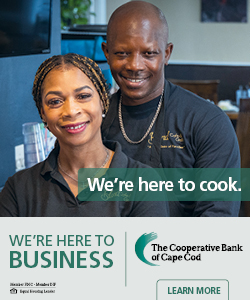With many restaurants still relying on take-out service, environmentally-minded residents are concerned about the increase in plastic waste that has resulted from adjustments made due to the COVID-19 virus.
A new “Compostable Food Serviceware Buying Guide” aims to provide restaurants and other food service businesses alternatives to plastic take-out containers and serviceware, including cups, plates, bowls and utensils. The guide was released by CARE for the Cape & Islands and created in collaboration with the Wellfleet Recycling Committee and Woods Hole Sea Grant.
“We’re really pleased to make this new guide available,” said Jill Talladay, director of CARE for the Cape & the Islands. “Providing businesses and citizens more environmentally options is an important part of our mission to preserve and protect the beauty of Cape Cod, Martha’s Vineyard and Nantucket.”
Reusable serviceware is the most sustainable option when serving food in a restaurant or at nearby seating. “But when that’s not possible, we wanted to encourage restaurants and other food service businesses to use non-plastic disposable food serviceware – products that are compostable,” said Christine Shreves, a member of the Wellfleet Recycling Committee and one of guide’s primary creators. “In the guide, we provide a few examples of compostable cold & hot cups, soup containers, plates, food trays/boats, to-go food containers, food/deli wrap, cutlery, and straws, and we hope to be able to expand upon this list.”
The guide grew out of an on-going series of summits CARE for the Cape & Islands hosted, along with the Center for Coastal Studies and Cape Cod Anti-Litter Coalition, aimed at decreasing pollution, particularly plastic, in our environment. Local Chambers of Commerce, NGOs, businesses and government agencies working collaboratively formed five working groups to focus on key issues between summit meetings. The Cooperative Purchasing Working Group formed to assist businesses by identifying environmentally-friendly products and provide information on where they may be purchased.
“We’re hoping to establish cooperative purchasing as a means to reduce costs for local businesses by facilitating bulk purchasing of these products,” said Stephanie Murphy with Woods Hole Sea Grant and another of the guide’s creators. “This buying guide is the first step toward that goal.”
The new Compostable Food Serviceware Buying Guide is available for free download on the CARE for the Cape and the Islands website at https://careforthecapeandislands.org/plastic-waste-reduction/.























